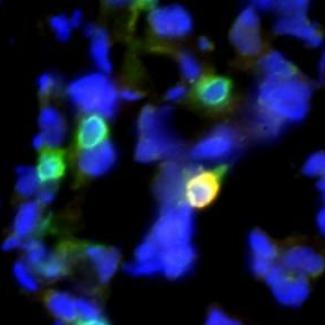
Areas of Research Neuroblastoma
Explore Our Areas of Research in Cancer and Blood Disorders
Bone Marrow Failure
Stem Cell Transplantation and Cellular Therapy
Bone Tumors
Brain Tumors
Cancer Genetics and Genomics
Cancer Survivorship
Cell and Gene Therapy
Developmental Therapeutics
Epidemiology (Cancer and Hematology)
Ewing Sarcoma
Hemostasis and Thrombosis
Histiocytosis
Immune Hematology
Immunotherapy
Leukemia
Liver Tumors
Lymphoma
Menorrhagia and Young Women's Bleeding Disorders
Neuroblastoma
Precision Oncology
Rare Tumors
Retinoblastoma
Sickle Cell Disease and Thalassemia
Soft Tissue Sarcoma
Solid Tumors
Thyroid Tumors
Bone Marrow Failure
Bone Tumors
Cancer Genetics and Genomics
Cell and Gene Therapy
Epidemiology (Cancer and Hematology)
Hemostasis and Thrombosis
Immune Hematology
Leukemia
Lymphoma
Neuroblastoma
Rare Tumors
Sickle Cell Disease and Thalassemia
Solid Tumors
Stem Cell Transplantation and Cellular Therapy
Brain Tumors
Cancer Survivorship
Developmental Therapeutics
Ewing Sarcoma
Histiocytosis
Immunotherapy
Liver Tumors
Menorrhagia and Young Women's Bleeding Disorders
Precision Oncology
Retinoblastoma
Soft Tissue Sarcoma
Thyroid Tumors
Bone Marrow Failure
Cancer Genetics and Genomics
Epidemiology (Cancer and Hematology)
Immune Hematology
Lymphoma
Rare Tumors
Solid Tumors
Stem Cell Transplantation and Cellular Therapy
Cancer Survivorship
Ewing Sarcoma
Immunotherapy
Menorrhagia and Young Women's Bleeding Disorders
Retinoblastoma
Thyroid Tumors
Bone Tumors
Cell and Gene Therapy
Hemostasis and Thrombosis
Leukemia
Neuroblastoma
Sickle Cell Disease and Thalassemia
Brain Tumors
Developmental Therapeutics
Histiocytosis
Liver Tumors
Precision Oncology
Soft Tissue Sarcoma

Ranked #6 in Cancer
Proud to be ranked one of the best children’s cancer centers in the country by U.S. News & World Report for seven consecutive years.
